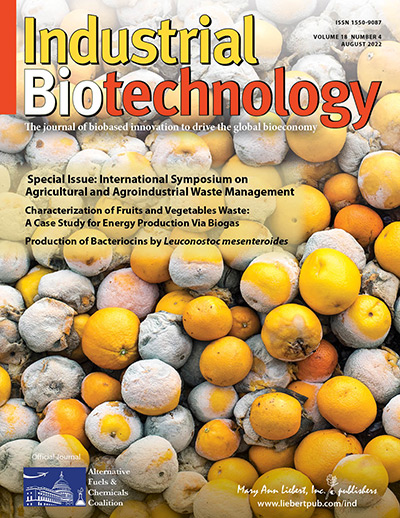Announcements
-
Call for Papers:
Enzymes from Extremophiles and Their Industrial Applications
The special issue will present a collection of the latest developments and recent scientific advances in the microbial enzymes derived from the extremophiles and their industrial applications. Submissions will be accepted until May 15, 2024.
Submit Your Manuscript -
New Indexing
Industrial Biotechnology is now indexed and fully searchable in the Web of Science: Emerging Sources Citation Index™ (ESCI) database.
Aims & Scope
Journal vision: To provide a forum for the community of scientists, engineers, and business leaders working in industry, academia, government labs and non-profit organizations toward the common purpose of advancing the role of biotechnology processes in chemical products, polymers, fuels, and food security. This vision is driven by the promise of biotechnology to provide a platform for revolutionary chemical synthetic methods and crop engineering that are less polluting, require lower energy inputs, reduce greenhouse gas emissions, and enable the world to pivot from fossil-derived carbon to sustainable chemical and food manufacturing that can contribute to an evolving circular economy.
Industrial Biotechnology is the authoritative, peer-reviewed, bimonthly research journal focused on the rapidly emerging fields of ‘White Biotechnology’ and ‘Agricultural Biotechnology’ for sustainable chemical and food production as well as associated ‘Societal Impacts’.
Advancements in White Biotechnology are fueled by continuously evolving biotechnological tools to mine microbial and enzyme diversity such as metagenomics and genomics. Furthermore, strategies such as rational, semi-rational and random directed evolution including artificial intelligence and machine learning algorithms are allowing scientists and engineers to realize major improvements in enzyme function. These engineered enzymes can be incorporated into cells that are metabolically engineered by systems-level approaches using increasingly diverse and sophisticated tools. These exciting developments are changing the landscape and potential for developing cost-effective bioprocesses that will revolutionize the chemical industry. Examples of White Biotechnology research topics published by Industrial Biotechnology include but are not limited to carbon capture; engineering microbes to produce biobased building blocks, fuels, agricultural products, peptides, polymers (e.g., thermoplastics, thermosets, elastomers), nanoparticles, biosensors, lubricants, biopesticides, bio-actives (e.g. antimicrobials, chiral intermediates), nutraceuticals (e.g. bioflavonoids, omega 3 fatty acids, anti-oxidants), and prebiotics (galacto-oligiosaccharides, fructo-oligosaccharides); natural material networks (e.g., fungal mycelia, bacterial cellulose); cell plastics; living materials; cells and materials that are responsive to environmental cues; the built environment; cells/materials engineered to respond to environmental cues such as the presence of toxins; bioremediation; filtration; and much more.
Industrial Biotechnology publishes advances resulting from the following activities:
- Microbiology and microbial physiology
- Biochemistry
- Fermentation engineering
- Cell metabolism and energetics
- Protein engineering
- Metabolic engineering
- Process engineering inclusive of downstream processing
- Computational and systems biology, including bioinformatics and genomic/proteomic studies
- Biofilms
- Spectroscopic and other analytical techniques for biotechnological applications
- Life-cycle and techno-economic analyses
The agri-food industry has and will continue to use the increasing powerful tools of molecular biology and biotechnology to increase crop yields for food, feed, and chemicals. Industrial Biotechnology seeks to foster technological advances in the agri-food industry such as decreased crop losses due to biotic and abiotic stresses; engineered crops with increased resistance to pests and associated diseases that allows reduction in pesticide use; improving food nutritional value, flavor, and texture; improved vegetable and fruits resistant to decay and nutrient loss; and reduced content of toxins in foods. Also, of great interest is the use of plant systems for production of natural and non-natural polymers and specialty chemicals. We also invite contributions that focus on decreasing the energy input in disrupting interactions between components of lignocellulose and increasing sugar production. Approaches to achieve this objective include decreasing crosslinking between lignin and hemicellulose and decreasing lignocellulose content. Furthermore, we invite manuscripts that describe advances in phytoremediation. Contributions are also encouraged that help build basic research capabilities critical to realizing the above objectives such as creating chromosome maps; locating and identifying agriculturally important genes; understanding mechanisms for gene regulation and expression; and understanding the effect and behavior in the environment of genetically engineered plants.
Examples of research tools and approaches to achieve the above objectives include:
- Gene or genome editing techniques (e.g., CRISPR/Cas9), transcriptomics, proteomics, metabolomics, transcriptional regulation and bioinformatics
- Locating and identifying agriculturally important genes and creating chromosome maps
- The construction of vectors for the delivery and expression of genes
- High-throughput screening of transgenic plants for gene-editing events
- Mass multiplication of edited plants
- Phenotypic characterization of edited plants
- Data science, including artificial intelligence and machine learning
- PEG-mediated protoplast transfection
- Agrobacterium-mediated transformation
- Xcc-facilitated agroinfiltration
- Particle bombardment
- Mutation or conventional breeding
- Nanobiotechnology
- Crops and tree co-cultivation
- Complementing the soil microbiota
- Inoculating specific microorganisms
The Journal also invites contributions focused on societal and ethical issues related to industrial biotechnology. Current societal and ethical issues may consider clarifying what is sustainability, how should sustainability be measured, how a natural product is defined, how emerging risks of industrial biotechnology should be managed, and who will be the primary beneficiaries of industrial biotechnology advances and commercialization of products. We also invite discussions on what is needed to increase the pace at which industrial biotechnology advances are achieved, including development of the necessary infrastructure and workforce, creation of reliable supply chains, and acceleration of connectivity between synergistic technologies. Other issues threatening advances in industrial biotechnology include the long duration and high costs of regulatory approvals; the potential that modern biotechnology may increase the prosperity gap between rich and poor within individual societies and globally; potential losses in biodiversity; ethical concerns as to the moral dimensions of patenting living organisms and the cross-species movement of genes; misused gene editing, potentially resulting in biological pathogens; and whether off-target effects of CRISPR that lead to undesirable phenotypes can be controlled.
Industrial Biotechnology publishes fundamental and applied perspectives, articles, reviews, mini-reviews, and Communications to the Editor. Research articles must report original research that is expected to have a definable impact on the advancement of science and technology and must incorporate a significant component of innovative science and engineering. Novel experimental results, theoretical treatments, interpretations of data, and absence of prior publications on the same/similar topics constitute originality.
Areas outside the scope of Industrial Biotechnology includes: Most aspects of medical biotechnology, often referred to as “Red Biotechnology”. Examples include the study and production of biologics (e.g., hormones, blood products, cytokines, growth factors, vaccines, gene and cellular therapies, fusion proteins, insulin, interferon, and monoclonal antibody (mAb) products); vaccines; regenerative therapies including the use of stem cells; tissue engineering; drug delivery; diagnostics kits for disease detection; and SiRNA.
Industrial Biotechnology is under the editorial leadership of Editor-in-Chief Richard A. Gross, PhD, Rensselaer Polytechnic Institute, and other leading investigators.
Audience: Biochemists, molecular biologists, metabolic engineers, data scientists, chemists, microbiologists, social scientists, chemical manufacturers, chemical/environmental/agricultural engineers, agronomists, entomologists, bioprocess engineers, food scientists, and others.
Indexing/Abstracting:
- Web of Science: Emerging Sources Citation Index™ (ESCI)
- Scopus
- EMBiology
- FLUIDEX
- Compendex
- AGRICOLA
- Chemical Abstracts
- CAB Abstracts
- Global Health
- FSTA® (formerly Food Science and Technology Abstracts)
- BenchSci
Society Affiliations
The Official Journal of:


